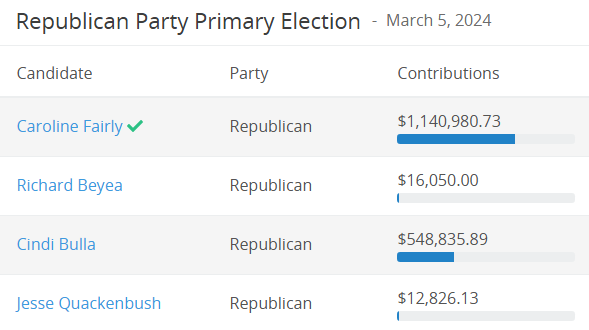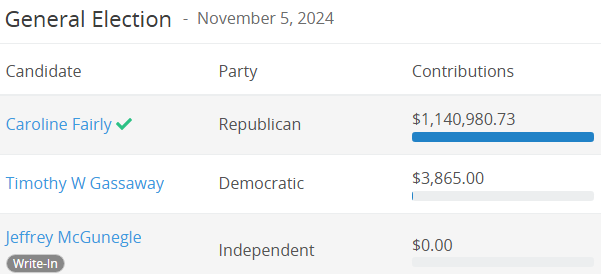The Oligarch's Daughter
Money, influence, and the cost of democracy in Texas.
Last week, on the Progress Texas podcast, Representative Donna Howard (D-HD48) discussed the structure of the Texas Legislature and the fact that only wealthy people can run for state office.
Check it out (less than two minutes):
It made me think about something else Congresswoman Jasmine Crockett (TX30) said back in 2021 when she was still in the State Legislature (less than one minute):
After Crockett said that, I began researching House members, starting at House District 01 (HD01)… I got into the 30s and gave up. The Texas House has 150 seats, and most Republican members are independently wealthy. Multi-millionaires. People who own thousand-acre ranches and giant 15,000-square-foot homes.
As Representative Howard said, compassion and empathy aren’t exclusive to any financial status. She went on to say that they don’t face the same struggles as everyday Texans, which impacts policies.
Maybe she’s right. Perhaps the Texas Legislature refuses to act on food insecurity in Texas, despite Texas having the second-highest rate of food insecurity in the nation at 16.9%, more than 4.5% higher than the U.S. average, because they don’t share the lived experience.
Maybe the reason they won’t do something about healthcare, despite 1,000 Texans dying every year because of inadequate access, is because they’ve never had that happen to someone they love.
And perhaps the grounds for not doing anything about the multitude of cancer clusters in Texas, despite the Texas Department of State Health Services publishing more than 260 cancer cluster investigations in the last decade, is because it didn’t happen to them.
For whatever reason, Texas Republicans haven’t worked for the people for a long time. To them, it’s about culture wars, corporate interests, and doing what’s best for their bottom line.
Yes, Texas is a plutocracy—we are governed by the wealthy. The Republicans in our state government represent the ruling class of the rich elite. However, within our state, there are also many oligarchs.
Too many. You know about Tim Dunn, Farris Wilks, and Dick Weekly, but there’s also Miriam Adelson, Ross Perot JR, Harlan Crow, and even Elon Musk. In the last election, 30 individuals spent over $1 million in Texas state politics. Eight of them spent over $5 million. Four of them were over $10 million.
Texas politics is big business.
Alex Fairly.
Alex Fairly is being called an emerging GOP megadonor and described as an “Amarillo businessman” in multiple news articles. He’s the CEO of the Fairly Group, but not a lot else is out there about him.
In 2018 and 2020, he donated less than $10,000 in state elections. Then, in 2022, he donated $62,000. Then, in 2024, he pops on the scene by donating $1.5 million. Of which, $225,000 went to his daughter, newly-elected House Republican Caroline Fairly (R-HD87).
He also donated another $1.5 million through his LLC, Dealon, with another $248,000 to his daughter. Thus, he contributed nearly half a million dollars to help his daughter win a seat in the Texas House. Over $3 million in all. $500,000 to Greg Abbott, who gleefully endorsed Caroline Fairly in the Republican primaries.
Earlier this month, Alex Fairly pledged to spend $20 million in the 2026 elections to “expand a true Republican majority.” As the Texas Tribune noted, this comes as Tim Dunn shifts his focus to federal elections.
Alex Fairly has been heavily involved in Amarillo politics for years, but this increased focus on Austin is new. Whether that’s because his daughter is now in the State House or because he saw how easy it was to buy politicians in Texas, Alex Fairly plans to be Texas’ newest oligarch.
For context, Tim Dunn spent $11 million in 2024’s state elections, while out-of-state billionaire Jeff Yass spent $16 million, which bought him almost two dozen House seats.
$20 million in one election cycle is obscene. It’s obscene—and it’s a problem. When a handful of ultra-wealthy individuals can funnel millions of dollars into elections, it drowns out the voices of ordinary Texans. It ensures that our policies reflect oligarchs’ priorities, not everyday people’s needs.
This is why we should all continuously advocate for two things:
What does $20 million buy in Texas politics?
What doesn’t it buy? Ryan Guillen sold his soul for $1.6 million. Shawn Thierry did it for $500,000. There is nothing in Texas politics that $20 million can’t buy. Influence. Power. Legislation written to benefit the donor class.
It buys a government that serves corporations and the elite while ignoring issues like food insecurity, healthcare, and environmental crises that affect millions of Texans. It buys silence on the most important things, like the devastating maternal mortality rate in Texas, the underfunding of public schools, and the skyrocketing property taxes squeezing working families. It buys the perpetuation of culture wars to distract voters from the real struggles they face every day.
But most of all, it buys a system designed to keep itself in power—a self-reinforcing cycle in which wealth begets influence, and influence ensures policies that protect and expand that wealth. This system leaves everyday Texans voiceless, powerless, and increasingly cynical about the possibility of change.
Too many of the 7.2 million people who didn’t vote in the 2024 election believed their voice didn’t matter and nothing would change.
And Alex Fairly’s daughter?
In Texas, politics runs on money, and Caroline Fairly outraised all her Republican opponents in the GOP primary.
She blew the Democrat out of the water (it’s a 79% Republican district):
And her daddy bought her all of the best endorsements for Republican politics in Texas.
Caroline Fairly is only 25 years old, the youngest female Republican elected to the House in Texas history. She still lives at home with her parents. Should her young age shield her from criticism?
Here is her speech from election night in the Republican primary:
But what should we expect from her in the 89th Legislative Session?
According to her website, her priorities are the border, LGBTQ+ eradication, and school vouchers. 🤦🏻♀️
78% of Texas schools and daycares have lead in their drinking water. Probably Caroline Fairly is more concerned with imaginary border issues than Texas children have access to safe drinking water because her family had fresh spring water flown into their ranch by helicopter every month. Of course, it’s not a shared lived experience.
1 in 4 Texas children experience hunger. Maybe the reason Caroline Fairly cares more about LGBTQ+ people existing than hungry children in Texas is because no one she’s ever loved has been hungry.
More than 80% of Texas prison inmates were high school dropouts. Perhaps Caroline Fairly is more preoccupied with funneling taxpayer dollars into the pockets of the wealthy with vouchers than fixing the school-to-prison pipeline because she’s never been vulnerable to the school-to-prison pipeline.
Caroline Fairly’s rise to power isn’t unique—it’s a feature, not a bug, of the Texas political system.
She comes from extreme wealth and privilege, with a family that has never known the struggles most Texans face. Her father’s millions bought her a seat in the Texas House, but she’s hardly the only one. Most Republicans in the Texas Legislature come from similar backgrounds, where financial security is a given, and access to power is practically inherited.
The system is designed this way. By requiring candidates to run campaigns demanding immense financial resources and refusing to pay legislators a living wage, the Texas Legislature ensures that only the wealthy—or those funded by the wealthy—can afford to serve. That’s why multi-millionaires, corporate executives, and ranch-owning elites dominate the Republican Caucus. It’s a closed loop, where the wealthy remain in power and craft policies to protect their own interests.
Caroline Fairly may be new, but she’s simply the next iteration of this cycle. She joins a long list of Republicans whose privilege disconnects them from the realities of hunger, inadequate healthcare, and crumbling public schools.
Texas will remain a plutocracy until we decide enough is enough.
The 7.2 million Texans who didn’t vote in 2024 had the power to change this system. But it’s not just about voting; it’s about organizing, holding elected officials accountable, and demanding a government representing the people, not just the elite.
So, what can you do? Start local. Support candidates who refuse corporate money. Advocate for campaign finance reform and a full-time legislature. Talk to your neighbors. Challenge the status quo.
The system thrives on apathy, but history proves that when the people rise, change becomes inevitable. The question is: Will Texans finally demand better? The answer starts with you.
January 7: Joint Legislative Committee - Effects of Media on Minors
January 14: The 89th Legislative Session begins.
March 14: The last day Legislators can file bills.
June 2: The 89th Legislative Session ends.
LoneStarLeft is a reader-supported publication. To receive new posts and support my work, consider becoming a free or paid subscriber.
Follow me on Facebook, TikTok, Threads, YouTube, and Instagram.






Thanks again for a very informative article and all that you do to make a difference for the better in Texas by promoting the common good.
I totally agree with your concluding para where you state,”The system thrives on apathy, but history proves that when the people rise, change becomes inevitable. The question is: Will Texans finally demand better? The answer starts with you.” My answer is yes. Hope more will join.
This was an EXCELLENT letter!! Thank you for your commitment to keeping us informed and engaged!